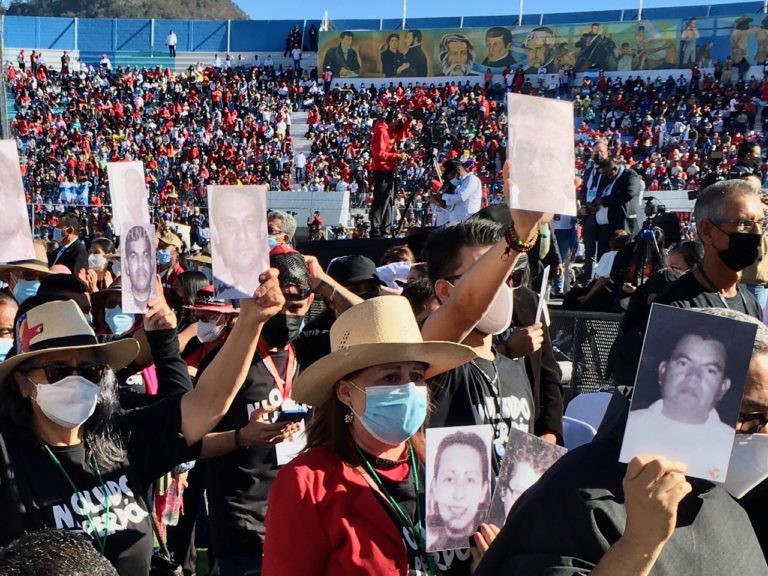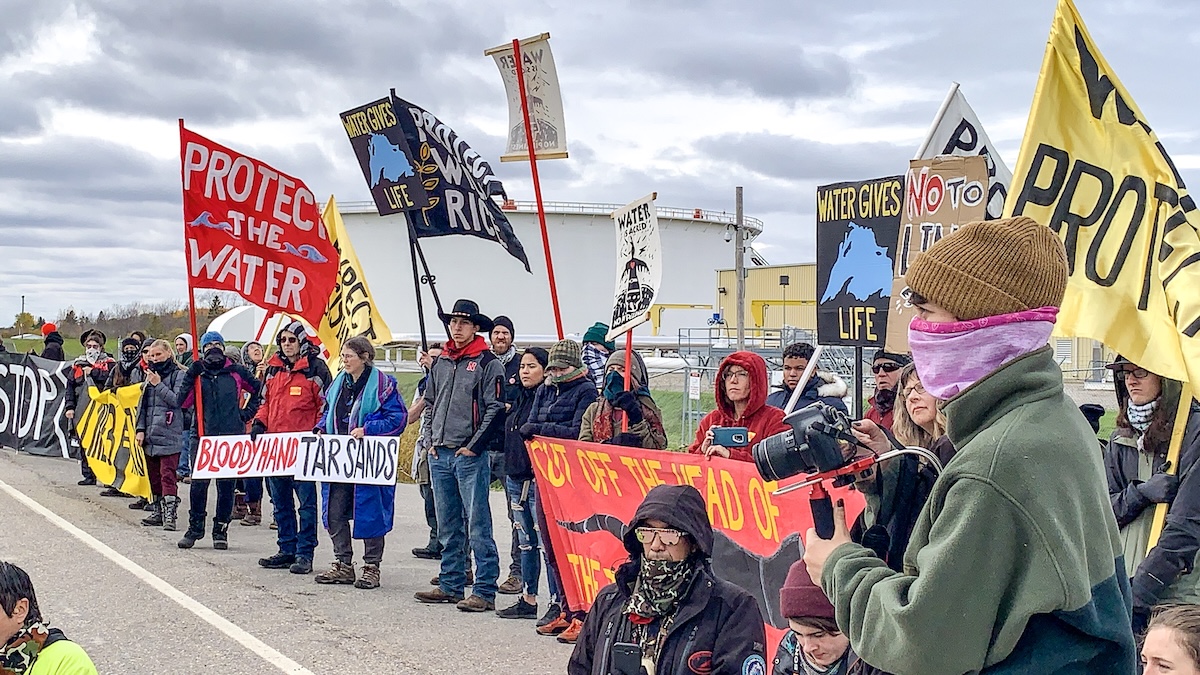By Jim Phillips
The United States has called for the extradition of former Honduran president Juan Orlando Hernandez, whose National party lost a presidential election last November. Now out of power, and with a new and very different President and Congress in Honduras, Hernandez is no longer immune to prosecution. He faces charges of drug trafficking on a massive scale. His brother, Antonio (Tony) Hernandez is serving a lengthy sentence in a U.S. prison for trafficking tons of drugs into the United States.
There are still some potential barriers to Juan Orlando’s extradition. The Honduran Supreme Court must allow the extradition; and there are rumors that the Attorney General (a Hernandez appointee whose term does not end until next year) may open an investigation of Hernandez in Honduras, trying to preclude an extradition request in order to protect Hernandez.
The U.S. extradition request provoked comments from two influential U.S. Senators who have been closely following Honduran events and have been highly critical of Hernandez during his tenure as president (2013-2021). They pointed out that the United States has been deeply implicated in supporting Hernandez’ excesses, even as it now demands his extradition.
“It was completely unacceptable that the U.S. government was supporting former President Hernandez despite his extensive ties to narco-trafficking, including an alleged pattern of using campaign funds and taxpayer resources to protect and facilitate drug shipments to the United States.” — Jeff Merkley (D-OR)
“Throughout the past eight years of decay, depravity, and impunity, successive U.S. administrations sullied our reputation by treating Hernandez as a friend and partner. By making excuse after excuse for a government that had no legitimacy and that functioned as a criminal enterprise, U.S. officials lost sight of what we stand for and that our real partners are the Honduran people.” — Patrick Leahy (D-VT)
Massive drug trafficking is not the only legacy of the Hernandez government. Widespread corruption and diversion of state funds into private hands; diversion of funds from social and public services (health, education, utilities) into militarizing the country; a geometric rise in the country’s poverty rate from about 30 percent when Hernandez took office to 70 percent today; and high rates of violence against women, environmentalists, human rights defenders, journalists, and members of the LGBTQ community have characterized his tenure. (Over the past twelve years, the Honduran murder rate has been 7 to 12 times the murder rate in neighboring Nicaragua.)
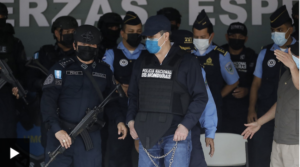
In many ways, Juan Orlando Hernandez is simply emblematic of the larger ways in which the United States has shaped Honduran “development,” especially since the 1980s. In 1980, the Honduran military returned power to a civilian president for the first time in seventeen years. The Reagan Administration sent the new weak civilian government a demand that the country embrace an economic development policy that encouraged and favored foreign investment and export expansion at the cost of internal production, small farmers, and local businesses (a plan derisively known among many Honduras as “Reaganomics for Honduras.” A group of powerful Honduran businessmen , military leaders, and politicians well placed to profit from this plan also issued a memo to the government demanding basically the same policies, favoring large-scale foreign and Honduran export industries and ignoring or suppressing local community needs and businesses (the so-called Facussé Memorandum, named for its main author, Miguel Facussé, one of the richest landowners and businessmen in the country).
This development strategy had its critics, including the chief economist of the Honduran Central Bank who predicted the real price of the plan would be the “misery” of the Honduran people. The Honduran Catholic Bishops Conference, in a declaration that proved accurate, warned that this model of development would lead to more poverty, violence, and corruption. But the United States and Canada had a strong interest in supporting and expanding this economic development model that emphasized large-scale extractive industries (mining, logging, export agriculture, tourism).
This became the path of Honduras for the next thirty years. It required the forcible displacement of many local rural and Indigenous communities whose lands contained important metal and mineral deposits (gold, iron ore, antimony), stands of mahogany and pine, rivers to be harnessed for energy, or locations desirable for tourist development. Local self-reliant communities that were not forced to abandon their way of life due to pollution and degradation of their environment by extractive industries were forcibly evicted by company “security guards” or police and military sent by the government. This created a growing pool of landless families who became dependent on a job market that had too few jobs, and none that paid living wages. In thirty years of this model of “development,” the children of displaced communities, now living in cities in poverty, were susceptible to gangs and drug traffickers, and could not rely on police who were often themselves colluding with gangs or were convinced that all poor youth were criminals.
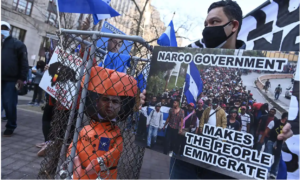 By 2015, we were seeing some of the consequences of this “development” as rapidly increasing numbers of Honduras began migrating to the United States to flee poverty, violence, and insecurity in Honduras. Having largely helped shape the conditions that prompted them to emigrate, the U.S. tried to shut them out when they came, by increasingly militarizing its southern border and deporting Hondurans without regard for their legal rights. (It bears repeating that seeking asylum in a foreign country is an internationally guaranteed legal right, and that asylum seekers in the United States are legally in the country unless or until their petition is denied by a duly constituted immigration court after a formal hearing.)
By 2015, we were seeing some of the consequences of this “development” as rapidly increasing numbers of Honduras began migrating to the United States to flee poverty, violence, and insecurity in Honduras. Having largely helped shape the conditions that prompted them to emigrate, the U.S. tried to shut them out when they came, by increasingly militarizing its southern border and deporting Hondurans without regard for their legal rights. (It bears repeating that seeking asylum in a foreign country is an internationally guaranteed legal right, and that asylum seekers in the United States are legally in the country unless or until their petition is denied by a duly constituted immigration court after a formal hearing.)
In addition to this extractive development policy, the United States also contributed to the current situation in other ways. In the 1980s, during the U.S. attempt to support the Nicaraguan Contras in their bid to overthrow the Sandinista government, Honduras became the staging ground for Contra raids into Nicaragua. This included deals with drug traffickers to raise money and arms for the Contras. This was detailed in Gary Webb’s book, Dark Alliance: The CIA, the Contras, and the Crack Cocaine Explosion (1998) and later depicted in a commercial film, Kill the Messenger (2014).
The drug trafficking and the arms did not disappear from Honduras after the end of the Contra war, but remained, contributing to the current situation. Honduran gangs were also an “export” from the U.S. when CentralAmerican youth familiar with U.S. gangs were deported from cities like Los Angeles in the decades after 1990. Back in Central America, these youthful deportees and their gang successors found a generation of poor youth whose families had been displaced by extractive industries and who were vulnerable to the lure of gangs.
Manuel Zelaya became Honduran president in 2005. As a member of a prominent landowning family, he was considered a safe member of the country’s ruling elite. But Zelaya promised to listen to and take account of the voices of local communities trying to defend their land and resources from extractive export industries. He also proposed raising the minimum wage of urban workers, and opening a relationship to ALBA, the commercial alliance led by Venezuela’s Hugo Chavez. Most threatening, Zelaya proposed a temporary moratorium on extractive projects until the concerns of local communities were taken into account. This threatened both the expansion of extractive projects and the control of the elite over the country’s development policies. Both the Honduran elite and Washington saw these moves as threats to their control and interests. The June 28, 2009 coup that removed Zelaya from power was engineered by a group of Honduran politicians including Juan Orlando Hernandez, who at the time was president of the Honduran Congress.
Although Honduran and international legal scholars denounced the coup as illegal under the Honduran Constitution and laws, the Obama Administration soon endorsed the new and illegitimate government, using several excuses. Secretary of State Clinton said Washington wanted to restore order to Honduras quickly and smoothly amid massive popular protests against the coup and the coup plotters (whom the Honduran people call golpistas). The golpistas spread the excuse that the coup was “necessary” because Zelaya was leading Honduras toward Venezuelan-style socialism. The fundamental reason for the coup and the U.S. acceptance of it, however, was to safeguard the interests of U.S., Canadian, and other corporations with extractive projects and investments in Honduras.
Four presidential elections have been held in Honduras since the 2009 coup. The golpistas made certain that their candidates kept winning: Pepe Lobo (2009-2013), and Juan Orlando Hernandez in 2013 and again in 2017. While the United States recognized all of these elections as legitimate, many Hondurans considered these three elections illegitimate and fraudulent. The 2009 election was held in the wake of the coup amid massive popular protests. Elections in 2013 and 2017 contained serious problems about ballot boxes and vote counting that allowed Hernandez to win despite significant concerns among international election observers. In addition, Hernandez ran for re-election in 2017 defied the Honduran Constitution’s prohibition against re-election. Despite all this, Washington continued to recognize the Hernandez government as an ally and partner in the region. This continued even as corruption scandals mounted, implicating Hernandez himself and many in his inner circle, as well as members of the Honduran Congress.
The kind of interests that the U.S. and Canada have been supporting with Hernandez as their partner is exemplified in the way in which Aura Minerals, a joint U.S.-Canadian mining company has in the past year defied both the law and the protests of the people of the small community of Azacualpa by unearthing the graves in the community cemetery and disposing of the bodies elsewhere—all in order to mine gold (open pit with cyanide) from the hillside. In the Honduras that Washington and Hernandez fashioned, profit has been more important than both the safety and security of the living and the peace of the dead.
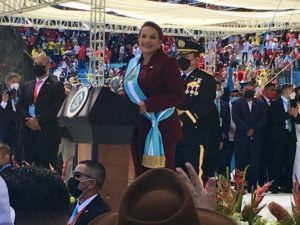
The election of Xiomara Castro as Honduran President last November was accomplished by a massive turnout of Honduran voters (almost 70 percent of those eligible), despite the allies of Hernandez openly trying to buy votes for months in advance of the election. Her victory was a strong demand for change. She has committed to moving the country away from dependency on foreign interests and toward an internal economy that will privilege local communities, so that Hondurans can work for their own interests and that of the country, instead of working only to get poorer and see their country’s resources extracted. Those resources include not only the natural wealth of the land but also the talent, energy, and creativity of Hondurans themselves. Under the increasingly harsh conditions during the years of the Hernandez government, Hondurans left their country in record numbers, as many as 100,000 in some years. People became a major export of Honduras to the United States.
Letting the new Honduran government of Xiomara Castro follow its program of transforming the Honduran economy without interference or subversion from the U.S. would go a long way to strengthening our real partners, the Honduran people, and reducing the conditions that have fueled immigration to the United States. In turn, that might require the courage to reform the ways in which U.S. and Canadian corporations have been exploiting Honduras. We as consumers and as voters have some say in this.

